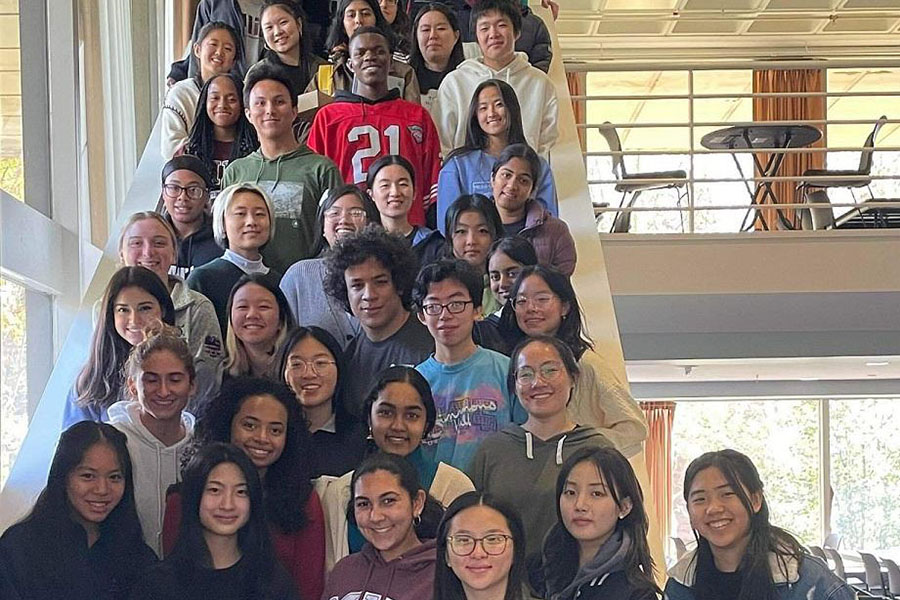
For 30 years, MIT MedLinks liaisons have volunteered to support MIT students with first-line medical care. Living in each of MIT’s residence halls and in numerous fraternities, sororities, and independent living groups, MedLinks administer basic first aid, share over-the-counter medicines when needed, explain MIT Health’s policies and procedures, and often simply listen to classmates talk about their health and well-being. MedLinks also help build community and plan events that bring people in their residence halls together. Recent events include ice cream sundae building, canvas painting, and tie-dying T-shirts.
Students who need ibuprofen in the middle of the night, twist their ankle and need an ice pack, or just need some throat lozenges can knock on their MedLinks volunteer’s door to get help with any of these and a host of other medical matters.
Greg Baker, senior program manager for community wellness at MIT Health, says the 150 MedLinks volunteers play a crucial role in connecting students to MIT Health and a host of other services.
“There is a 12-hour training for new volunteers that includes a review of MIT Health’s clinical offerings, campus and community resources, the supplies they receive and in what situations they should or should not be distributed, as well as active listening, and caregiver burnout. We’re also lucky to have our campus partners host sessions to share more about their departments — including the Ombuds Office, DoingWell, Alcohol and Other Drug Services, Institute Discrimination and Harassment Response Office, DAPER [Department of Athletics, Physical Education and Recreation], and Student Mental Health and Counseling,” says Baker.
After a year as a MedLinks volunteer, students can become a MedLinks residential director (RD) after going through additional training. The RD coordinates monthly meetings and events with the other MedLinks in their living group, checks supplies, and along with other MedLinks submits reports to MIT Medical.
Em Ball and Maia DeMeyer are residential directors for Burton Connor and Random Hall, respectively. Ball, a junior majoring in chemistry who is originally from Iowa, became a MedLinks volunteer because she is interested in going to medical school when she completes her undergraduate studies.
“One of the best things about being an RD is meeting and helping people. I especially enjoy putting together our events. We just had a cupcake-decorating event, and the people who came had a great time and said they had fun. The ability to take a break for your mental health is undervalued and very important,” says Ball.
DeMeyer, a sophomore majoring in computer science and engineering who is originally from Washington state, became a MedLinks volunteer for similar reasons: “I like to take care of people. I would rather someone knock on my door in the middle of the night seeking help than ignore a medical problem. I also enjoy being a resource for our community because Random Hall is small; it feels like family there.”
Flu season tends to be busier than the rest of the year. Ball and DeMeyer often advise students when they should go to MIT Health, Student Support Services, or Urgent Care. They also interview potential MedLinks liaisons and help onboard them once they have completed training.
Baker observes, “They have a lot of responsibility, as Em is the RD for 14 other MedLinks volunteers and Maia is the RD for five other volunteers. We appreciate their help, as well as the help of all our MedLinks volunteers. We hold celebration dinners and give them small gifts of appreciation at year’s end.”
DeMeyer and Ball love their residential communities and still make time to sing with the MIT Centrifugues co-ed a cappella group, where Ball is co-music director and DeMeyer is the business manager. Ball is also a member of track and field and cross-country teams, and DeMeyer serves on several of Random Hall’s governing committees.
“I found my niche here at MIT and it feels like home. It’s challenging, and MIT pushes everyone to be their best, so I know I can prosper here,” says DeMeyer. Ball agrees, “MIT fits my personality. It’s a very supportive community.”
MIT students who are interested in learning more about the MedLinks program can visit the website for more information.
